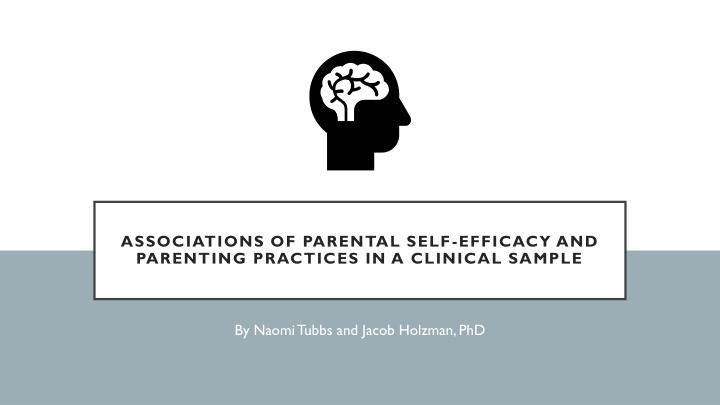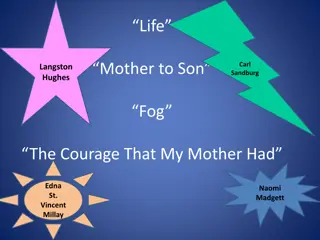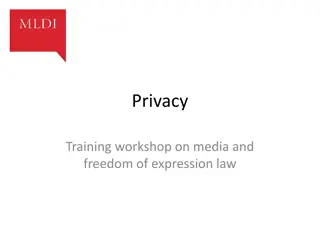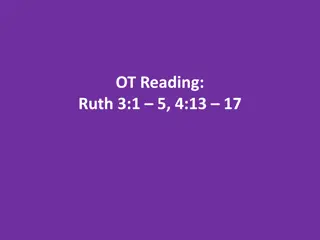
Parental Self-Efficacy and Parenting Practices in Clinical Sample
This study explores the associations between parental self-efficacy, parenting practices, and child behavioral concerns in a clinical sample. The research investigates how self-efficacy influences effective parenting styles and its impact on child behavior, aiming to identify factors targeted in clinical interventions.
Download Presentation

Please find below an Image/Link to download the presentation.
The content on the website is provided AS IS for your information and personal use only. It may not be sold, licensed, or shared on other websites without obtaining consent from the author. If you encounter any issues during the download, it is possible that the publisher has removed the file from their server.
You are allowed to download the files provided on this website for personal or commercial use, subject to the condition that they are used lawfully. All files are the property of their respective owners.
The content on the website is provided AS IS for your information and personal use only. It may not be sold, licensed, or shared on other websites without obtaining consent from the author.
E N D
Presentation Transcript
ASSOCIATIONS OF PARENTAL SELF-EFFICACY AND PARENTING PRACTICES IN A CLINICAL SAMPLE By Naomi Tubbs and Jacob Holzman, PhD
BACKGROUND Parental self-efficacy and parenting practices are associated with child behavioral concerns Parental self-efficacy can be described as an individual's beliefs in their own capabilities as a parent Past research has shown that increased parental self-efficacy is associated with more positive parenting and less inconsistent discipline This increase in effective parenting has been shown to be linked to decreased child behavioral concerns
THE CURRENT STUDY HYPOTHESES The current study aimed to identify how parental self-efficacy and effective parenting styles can affect child behavioral concerns in a clinical sample 1. Parental self-efficacy will be positively associated with effective parenting practices. Specifically, increased self-efficacy will be linked to increased positive parenting and decreased inconsistent discipline. Less research has been done examining these factors in a treatment seeking sample Results from this study will help identify the factors that should be targeted in clinical interventions concerning child behavioral concerns 2. Child behavioral concerns will be inversely associated with effective parenting practices. Specifically, increased behavioral concerns will be linked to decreased positive parenting and increased inconsistent discipline. 3. Parental self-efficacy will be inversely associated with child behavioral concerns. In that, parents with higher self-efficacy will have children with fewer behavioral concerns.
METHODS Following IRB approval, charts of 64 children whose caregivers participated in a brief parenting group were reviewed. Prior to treatment, caregivers completed several surveys assessing: Child s behavioral concerns: Eyberg Child Behavior Inventory Parenting Efficacy: Parenting Sense of Competence Parenting Self-Efficacy Scale Parenting Practices: Alabama Parenting Questionnaire Short Version Child behavioral concerns were investigated both in terms of the frequency and how problematic the behavioral concerns are.
Inconsistent Discipline and Self-Efficacy RESULTS We did not find a significant relationship between parental self-efficacy and effective parenting practices (p>.10). Positive Parenting and Self-Efficacy
Positive parenting was not shown to be significantly associated with child behavioral concerns (P>.10).
Increased inconsistent discipline was shown to be marginallypositively associated with child behavioral concerns (p=.06, p=.08).
Parental self-efficacy was significantly inversely associated with child behavioral concerns (P<0.05, p<0.05).
CORRELATIONS Variable 1 2 3 4 5 1. Parenting Efficacy 1.0 -.068 .031 -.434 -.360 2. Positive Parenting 1.0 -.165 -.023 -.186 3. Inconsistent Discipline 1.0 .268 .285 4. Child Behavioral Concerns Frequency 1.0 .860 5. Child Behavioral Concerns Problem 1.0
DISCUSSION There is marginal evidence that increased levels of inconsistent discipline is associated with increased child behavioral concerns. More data is needed to confirm this. A possible explanation for why we did not see parental self-efficacy effecting parenting style could be because the sample used was a treatment-seeking population with high levels of behavioral concerns. Since we found clear evidence that parental self-efficacy is linked to child behavioral concerns in a clinical sample, this could provide insight into what should be targeted in clinical interventions for children with behavioral concerns.
LIMITATIONS One limitation of this study is that it is a nonexperimental design, meaning none of the variables were manipulated. Another limitation of this study is that it was a small sample size. Finally, our measurements were self-report, which is not always an accurate measure.
ACKNOWLEDGMENTS Thank you Dr. Holzman for this opportunity and for all his help throughout the process. I would also like to thank Dr. Douglas Novins, Dr. Neill Epperson and Dr. Dominic Martinez for providing funding to this program and granting me this opportunity. Thank you Emmaly Perkins and Lily Luo for all your help and support.









